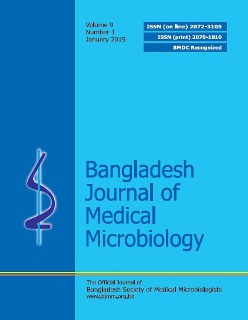Prevalence and antibiogram of ESBL producing gram negative bacilli isolated from urine in Dhaka Medical College Hospital, Bangladesh
DOI:
https://doi.org/10.3329/bjmm.v9i1.31337Keywords:
Antimicrobial resistance, Bangladesh, ESBL, Gram negative bacilli.Abstract
Extended spectrum ß-lactamase (ESBL) producing strains are resistant to a wide variety of common antimicrobials and become a major clinical concern worldwide that has complicated treatment strategies. The current study has been carried out to detect ESBL producing gram negative bacilli with their antimicrobial susceptibility pattern from urine collected over a period of 12 months from July 2011 to June 2012 from Dhaka Medical College Hospital. Samples were cultured in blood agar and MacConkey's agar media and organisms were identified by different biochemical tests such as oxidase test, reaction in MIU and simmon's citrate media and different sugar fermentation tests. ESBL producers were detected by double-disk synergy test (DDST). From total of 300 urine samples, 157 (52.33%) gram negative bacilli causing UTI were isolated and most of them were Escherichia coli (71.34%) followed by Enterobacter aerogenes (13.38%). Among the isolates, 45 (28.66%) ESBL producers were detected. The highest of ESBL producer was observed in Escherichia coli (32.14%) followed by Klebsiella pneumoniae (28.57%), Enterobacter aerogenes (23.80%) and Acinetobacter spp (20%). ESBL producers were significantly more resistant to ciprofloxacin, gentamycin, doxycycline, amoxiclav and co-trimoxazole than non-ESBL producers. All the ESBL producing strains were sensitive to imipenem. The result of this study provides insight into the high proportion of highly resistant ESBL producing organisms and more effective strategies are needed to control the spread of these resistant organisms.
Bangladesh J Med Microbiol 2015; 9 (1): 17-21
Downloads
130
188

